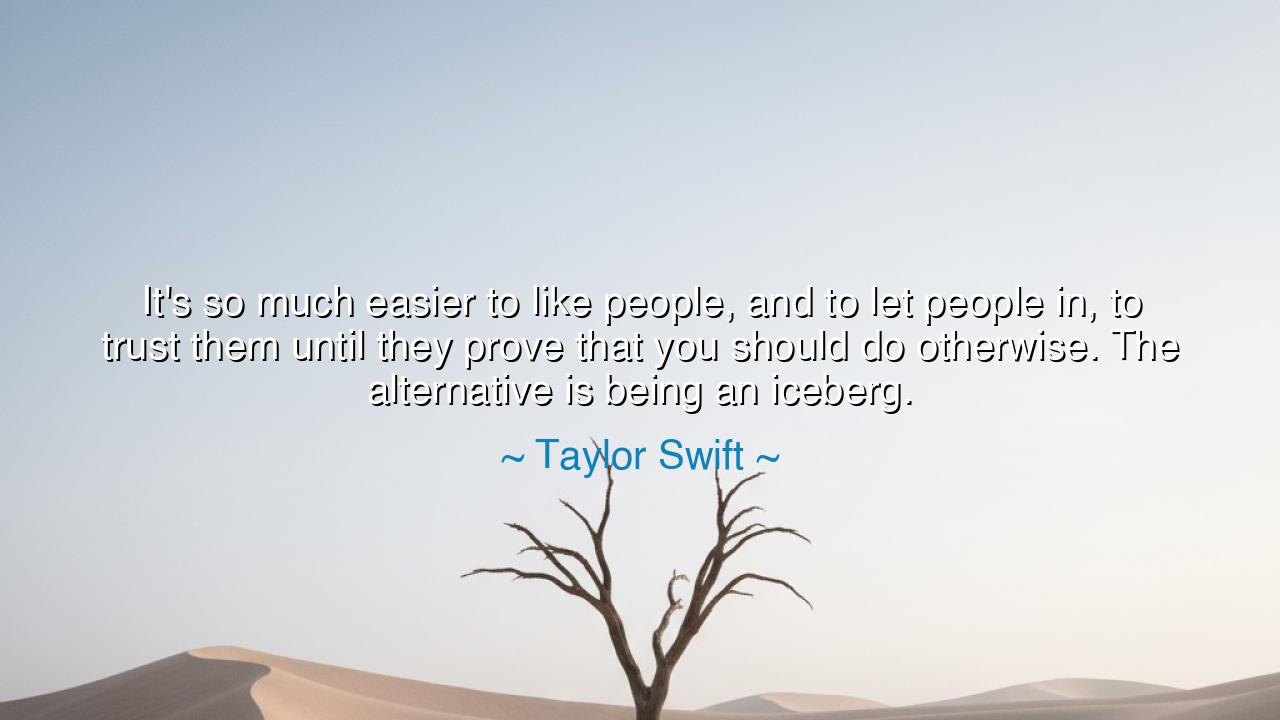
It's so much easier to like people, and to let people in, to
It's so much easier to like people, and to let people in, to trust them until they prove that you should do otherwise. The alternative is being an iceberg.






“It’s so much easier to like people, and to let people in, to trust them until they prove that you should do otherwise. The alternative is being an iceberg.” Thus speaks Taylor Swift, a singer not only of melodies but of truths woven from the fabric of human relationship. Her words reveal a wisdom that the ancients themselves would have cherished: that to live with trust and openness is to live warmly, fully, and bravely, while to shut oneself off in suspicion is to become as cold and lifeless as an iceberg, drifting alone in barren seas.
For the heart of man was not made for walls but for bridges. The ancients told stories of hospitality—the Greeks believed that every stranger might be a god in disguise, and so they welcomed them with open arms. In this openness, trust was the seed of community. Swift’s words echo this ancient law: that life is richer when we assume the good in others first, not the bad. To like people, to let them near, is to embrace the risk of disappointment for the far greater reward of love, friendship, and kinship.
Consider the tale of Julius Caesar and Brutus. Caesar, by trusting too freely, met betrayal. And yet history does not condemn his openness, but rather condemns the treachery of those who broke his trust. Caesar lived expansively, extending confidence even where it was unwise. Brutus, in his act of betrayal, was remembered not as wise, but as cursed. Swift’s lesson is the same: better to trust and be wrong than to live hardened and unreachable. For mistrust may protect you from wounds, but it also denies you the joys of true connection.
The image of the iceberg is powerful. Cold, immense, seemingly indestructible, it drifts with dignity upon the ocean—but its core is frozen, untouched by warmth, unreachable by love. So too does the human heart become when it refuses to trust: strong on the outside, but isolated, burdened, and alone. To live like an iceberg may shield one from harm, but it also ensures that life passes by without the sweetness of intimacy, without the warmth of friendship, without the fire of shared joy.
Yet let us not think Swift urges blind naiveté. She counsels to trust until they prove otherwise—to begin with generosity, not suspicion, and to let another’s actions determine their worth. This is the wisdom of discernment, not the folly of blindness. The open heart is not foolish, for it sees clearly when trust is broken. But it refuses to let fear close the gates before the journey even begins. Such courage requires strength, for to risk betrayal is a heavy price—but it is the only path to true connection.
The lesson is thus: live warmly, not coldly. Give others the gift of trust before they have earned it, for in doing so you create the possibility of love and fellowship. If betrayal comes, let it be their burden, not yours. Better to have trusted and been hurt than never to have known closeness at all. To lock the heart is to lose not only pain, but also joy—and such a trade leaves the soul poorer than death.
Practical wisdom follows: when you meet new people, lean toward openness. Offer kindness without suspicion, listen without judgment, and extend trust as a gift. Guard yourself, yes, when patterns of betrayal emerge, but do not preemptively close the gates. Practice forgiveness, for forgiveness melts ice and keeps the waters flowing. And remind yourself daily that love, friendship, and fellowship are worth the risks they demand.
So let Swift’s words endure: “The alternative is being an iceberg.” O children of tomorrow, do not choose to drift frozen, cold and alone. Choose instead to live as flowing waters, warm and open, willing to trust and to risk, for in such courage lies the only path to true connection. For the one who loves openly, even when wounded, will know life more deeply than the one who never dared to trust at all.






TTuyen
This quote makes me reflect on my own life. I’m definitely someone who tends to keep people at arm's length. But, after reading this, I’m questioning if I’m being too closed off, like an iceberg. How do we know if we’re keeping our distance for self-protection or because we’ve become too cynical? Is there a way to thaw out without being too trusting and getting hurt again?
HUHoang Uyen
I agree with this quote, but I wonder, is it really always possible to trust people until they give you a reason not to? Some people are just naturally more guarded, and it doesn’t mean they’re icebergs. There might be times when someone has a reason to hold back, yet still deserves to be trusted. How can we recognize the difference between cautiousness and genuine mistrust?
YTYen Tan
I’m torn by this quote. On one hand, it sounds like a healthy way to approach relationships, letting people in with an open heart until they prove otherwise. But I’ve experienced times when I let my guard down too quickly, and that backfired. Should we always give people the benefit of the doubt, or is there wisdom in being cautious from the start? What do you think about this balance?
N1Thuy Hang Nguyen 10A3
I really like how Taylor Swift expresses this. It seems like she’s advocating for vulnerability and giving people the chance to show who they really are before shutting them out. But, doesn’t this kind of openness leave you open to disappointment sometimes? It’s hard to balance being open and protecting yourself from the wrong people, you know? How do you know when it’s safe to trust someone fully without getting hurt?